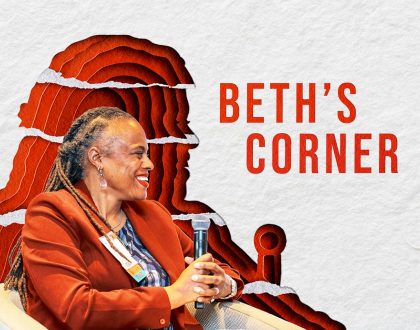Beth’s Corner: Approaching DEI With Disciplined Courage

If you read my letter last month, you heard the news that YW Boston is spending this year focusing on strategies for remaining courageous in the face of unprecedented attacks on diversity, equity, and inclusion initiatives. We are framing our content and offerings in the context of the four types of everyday courage, which are disciplined courage, intellectual courage, moral courage, and empathetic courage.
This month, we’ve been exploring the concept of disciplined courage—or the courage to be reflective, strategic, and focused in the face of constant distractions and opposition. These three aspects—reflection, strategy, and focus—relate directly to DEI work, and to leaders and individuals at all organizational levels doing the work:
- Reflection – In order to be strategic and focused, leaders need to be deeply reflective about how they are contributing to the conditions in their organization. They must be able to evaluate their self and organization accurately and dispassionately to clear a path forward.
- Strategy – Leaders with disciplined courage keep their eyes focused and energies aligned on the solutions that will have the most impact at an organization. For change to be successful, you need to keep the energy around change focused on the most impactful areas.
- Focus – Change is not fast; it takes time and can be very slow and messy. Leaders who practice disciplined courage are willing and able to push through and keep momentum going over the long haul. You don’t have to have a “must fix everything right now” mindset—you must be able to see the big picture and be content with making consistent, small strides towards your DEI goals.
Keep in mind that when doing DEI work, there will always be distractions, other priorities, and different things that may feel more emergent or pressing. You must also be ready to face various forms of opposition. There is the big picture opposition: All the cultural forces telling us to deprioritize DEI, that “wokeness” is bad, etc., and there is the small picture: The colleagues who say they value DEI, but then do nothing but slow or water down change processes, throw up roadblocks, and push back. A common example of small-picture opposition is saying “Oh, we live in New England; we don’t need to worry about racism/transphobia/etc. here.”
To combat the distractions and opposition, make sure you have a clearly defined vision of success and check against it regularly. And remember to set aside time for ongoing personal and professional reflection. This work is not easy, and you need to give yourself moments to catch your breath and recharge if you want to remain steadfast and deliberate in your goals. If you can maintain a focus on DEI despite a setback or one initiative not going as planned, that is practicing disciplined courage.
P.S. I want to thank our InclusionBoston Organizational Development Senior Manager, Piper Slowinski, for contributing her change management expertise to this letter.
Beth Chandler is President & CEO of YW Boston. Learn more about Beth here.
